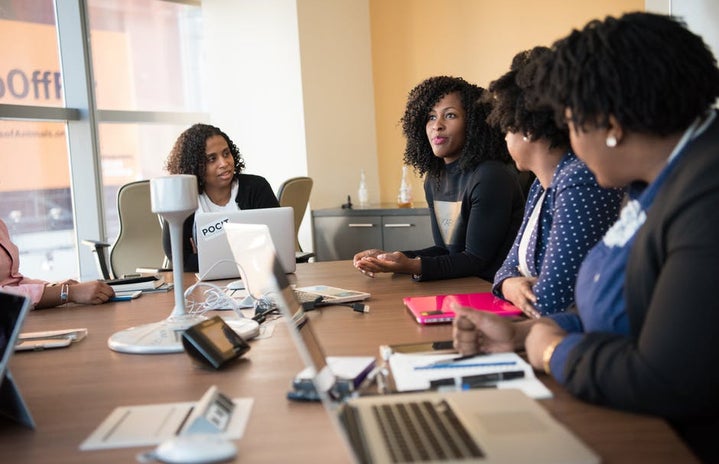We’ve all experienced the anxiety of shopping for the right professional outfits and figuring out appropriate hairstyles for interviews and career workshops. Usually, as a way to alleviate anxiety, we’d do a quick google search for the best looks. But interestingly enough, a quick google search on professionalism will not only show you what type of blazer you should wear but it’ll also tell you a lot about race relations in America. After googling “professional outfit”, I found that the majority of the women sporting blazers and pantsuits are white women.
The lack of representation of black people in these google searches isn’t because black people aren’t a part of the working population in the United States. Instead, it is representative of the whiteness that is enforced in workspaces–and other spaces– around the country. This obviously adversely affects how people of color view themselves in these environments. And it contributes to the impostor syndrome that many of these individuals from these underrepresented communities experience.
The issue with representation continues when an individual googles “professional hairstyles.” A “professional hairstyle” google search yields a collection of majority white women, while an “unprofessional hairstyles for work” google search yields a collection of black women wearing their natural hair. We know there’s a problem, when it’s considered unprofessional for certain people to wear their hair as it naturally grows out of their head.
Historically, and perhaps intentionally, American professionalism has historically excluded principles of blackness. It goes back to the 18th century Tignon Laws in Antebellum New Orleans that forced newly emancipated black women to cover their hair with head wraps. These laws aimed to return black women to a subordinate, inferior status and they set the stage for similar mandates that deemed natural black hair as inappropriate. Since its inception, the American military has banned cornrows, afros, locs and other protective styles – only recently lifting the locs ban in 2017. Laws like these have contributed the narrative that black hair cannot be professional. This is part of the reason why we see natural black hair labeled as unprofessional.
I challenge the new generation of professionals not to let these misrepresentations hinder their career progression. Know that you are the perfect example of professionalism – just as you are! Fight the narrative that your appearance doesn’t fit the label of “professional employee,” and know instead that your work ability goes beyond the color of your skin!


